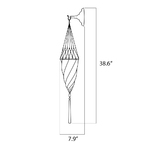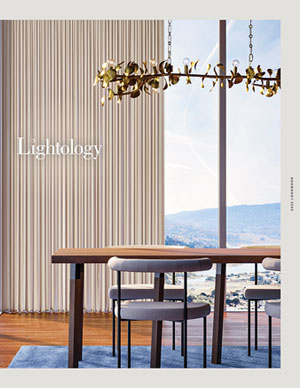Cesendello Silk Wall Light
By Mariano Fortuny, for Venetian Designs
Cesendello Silk Wall Light
By Mariano Fortuny, For Venetian Designs
$1,563.00
Usually leaves warehouse in 3-4 months
Based upon stock availability.
$1,563.00
+ FREE SHIPPING
SPEC #: VEN16584 | ID: 017CE-2-IV-CL
Cesendello Silk Wall Light
SPEC #: VEN16584
ID: 017CE-2-IV-CL
Designed by Mariano FortunyRead Bio
Adorn your walls with the historical elegance of the Cesendello Silk Wall Light, a luminous tribute to the sanctuary lamps of ancient Rome and Byzantium. This beautifully crafted Italian sconce features a pure silk shade in an Ivory Classic hue, complemented by a refined brass finish and a deep dark brown canopy.
The Cesendello Wall Light offers a harmonious blend of form and function. It provides a soft, ambient glow, making it an ideal choice for enhancing hallways, adding a touch of global sophistication to living areas, or creating a serene atmosphere in bedrooms.
Available Options
Specifications
- Finish: Brass
- Color: Ivory Classic Silk
- Size: 7.875"W x 38.625"H x 7.875"D
- Dimmer: Standard 120V
- Lamp Source: Incandescent
-
Bulb:Bulb not included
- Total Wattage: 25 watts
- Other Bulb Options:
Smart Home Compatible
Specification Sheet / Technical Files

About Mariano Fortuny
Mariano Fortuny y Madrazo was born in Granada, Spain in 1871 but spent his life in Venice, Italy. Often described as a latter-day "Renaissance Man", Fortuny was an innovator, and a thorough original. He was as well-versed in physics and chemistry as he was in art and design.
Although remembered primarily as a dress and fabric designer, Fortuny was also a painter, engraver, architect, photographer, set designer, lighting technician, inventor and impresario. As a painter, he was interested in the properties of light and its potential for drama.
In 1901 he patented an indirect theatrical lighting system, and constantly refined it thereafter. Perhaps Fortuny's most influential invention is the dimmer switch, first put into practice when he collaborated with Gabriele D'Annunzio on the stage production of the Ricardo Zandonai opera Francesca da Rimini. Fortuny was the first to make use of the opportunities electricity presented to the theater, and the techniques he invented helped to revolutionize stage lighting.
He began his research in his attic studio in Venice's Palazzo Marinengo. There, he observed rays of sunlight leaking into a darkened room. In his 1904 treatise Eclairage Scenique (Stage Lighting), he relates how he made the discovery that formed the basis of his indirect light technique. He concluded that "it is not the quantity, but the quality of light that makes things visible and allows the pupil of the eye to open properly." He further noted than that if instead of natural light an artificial light source is used, the result is the same, but with the advantage that the quantity of light can be controlled by moving the source. Also, "if the light were shone onto a surface which was multi-colored, and which could be moved up to or away from the light source, the reflected light would take on the same colors and also be controllable in its intensity."
This discovery meant that it was now possible to achieve infinite degrees of dimness and brightness, as well as a vast range of colors that could change from one to another. Fortuny's lamp designs embody his design principles as well as his personal enthusiasms. The Fortuny Modalamp is strikingly contemporary despite its 1903 patent. Intended for use as a stage lamp, it is an elegant illustration of his principle of reflecting diffuse light off of a concave surface. A similar technique is at work in a collection of silk lamps influenced by Arabic decorative motifs. Fortuny was widely celebrated during his life and was known by many contemporaries as the "Magician of Venice." Even while alive he was regarded as something of enigma, and undoubtedly many secrets died with him in 1949.
Shop This Designer

Fortuny lamps are produced exclusively by Venetia Studium, the only company in the world entitled to use the trademark. Sophistication, refined techniques, a high quality finish and attention to detail are the distinctive features of each original lamp.
Explore Venetian DesignsReviews
No Reviews















